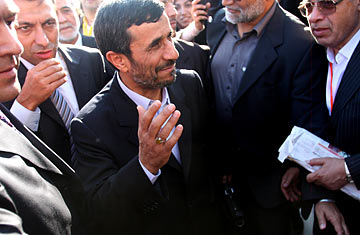
Iranian President Mahmoud Ahmadinejad leaves a meeting of the Organization of the Islamic Conference in Istanbul.
President Barack Obama spent much of his time in Asia warning Iran that his patience for nuclear diplomacy is wearing thin. "Iran has taken weeks now and has not shown its willingness to say yes to this proposal," Obama said Thursday in Seoul, referring to a deal under which Iran would export the bulk of its stock of enriched uranium to Russia for conversion into reactor fuel. "And so, as a consequence we have begun discussions with our international partners about the importance of having consequences."
But Friday's meeting in Brussels between representatives of the group of Western powers, Russia and China that has been negotiating with Iran produced little indication that new sanctions may be imminent if Iran continue to prevaricate. The difficulty facing Washington in mustering support for ratcheting up pressure on Iran was already clear in Thursday's statement by a Russian foreign ministry official that, "As far as we know, there has been no final official answer from Tehran", and that "there is currently no discussion on working out additional sanctions against Iran." And Friday's Brussels meeting simply reaffirmed disappointment in Iran's failure to embrace the deal thus far, but reiterated the commitment of the Western powers, Russia and China to continue to engage in dialogue with Tehran.
The Russian position is technically correct: Iran hasn't formally responded, but for the Western powers, that's the whole point — the proposed deal was negotiated weeks ago with Iranian representatives in Vienna, and Iran's government was asked to endorse it within a couple of days. But the plan faced a firestorm of criticism from across the political spectrum in Tehran, prompting the government of President Mahmoud Ahmadinejad to backtrack. The aspect of the plan that most appeals to the West — removing from Iran most of a uranium stockpile that could hypothetically be turned into a weapon, and returning it in the form of harmless fuel rods — is the one that has caused Tehran to balk. Many Iranian leaders suspect the deal is part of a plan to deprive it of the right to enrich uranium on its own soil, which remains a stated goal of the U.S. and its Western allies.
Rather than reject the deal, outright, Tehran declares support for its framework, but has begun floating counter-proposals on the timing and scale of the Iranian uranium exports it would involve, aiming to avoid relinquishing most of Iran's existing nuclear fuel stock by the end of this year, as the Vienna proposals envisioned. Iran's foreign minister, Manoucher Mottaki, on Wednesday reiterated that Iran would not ship out its stockpile, "but can review swapping it simultaneously with nuclear fuel inside Iran." That's simply the latest in a series of counter-proposals floated through the media, none of which has any appeal to the U.S. and the Europeans. They insist that the Vienna deal is a take-it-or-leave it offer, and are reading Iran's equivocation as a "no".
Hence the move to initiate new sanctions, which won't realistically be put in place until early next year. But despite White House spin to the contrary, there's little reason to believe Russia and China are more likely to back meaningful sanctions in the wake of Obama's recent meetings with Presidents Dmitry Medvedev and Hu Jintao than they were before those talks. While Medvedev urges Iran to be more cooperative and warns that further sanctions may be "inevitable" if it isn't, that's the perspective of a mediator. Prime Minister Vladimir Putin, still presumed to be "the decider" in Moscow, has warned that threatening new sanctions will jeopardize prospects for a diplomatic solution to the standoff, and are unlikely to work — raising the prospect of a confrontation.
